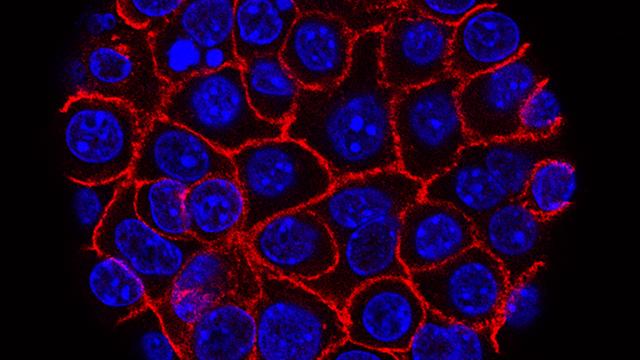
Christine Campo Alewine, M.D., Ph.D.
- Center for Cancer Research
- National Cancer Institute
- Building 37, Room 5116B
- Bethesda, MD 20892
- 240-760-6146
- alewinecc@mail.nih.gov
RESEARCH SUMMARY
Dr. Alewine is an NIH Lasker Scholar in the Laboratory of Molecular Biology. Her research focuses on identifying new treatments for pancreatic cancer including pancreatic adenocarcinoma, adenosquamous carcinoma, and acinar cell carcinoma. Dr. Alewine is board certified in internal medicine and medical oncology.
Areas of Expertise
Information for Patients
Learn more about our clinical trials and the highly specialized care teams that lead them.

Christine Campo Alewine, M.D., Ph.D.
Research
Pancreatic cancer is a devastating disease that kills more than 45,000 Americans each year. About 10% of patients survive five years or more after diagnosis because the disease metastasizes very early in its development and is difficult to treat. More effective and tolerable systemic therapies are needed for treatment of pancreatic cancer patients.
Pancreatic ductal adenocarcinoma (PDAC) is the most common type of pancreas cancer. PDAC has a dense tumor microenvironment that contains cancer-associated fibroblasts that can both support and restrain cancer cell growth. The therapeutic cytotoxin ProAgio remodels the tumor microenvironment by targeting and killing cells that express integrin alpha-v beta-3. These include cancer-associated fibroblasts, macrophages and endothelial cells as well as some cancer cells. We are currently testing this first-in-class drug in the clinic. In the laboratory we are working to: 1) identify effective combination therapies that can enhance penetration of biologic type therapeutics to PDAC and 2) understand molecular signals that contribute to PDAC peritoneal metastasis, one of the most common sites for PDAC to spread.
Rarer exocrine tumors of the pancreas are typically treated with standard therapies optimized for PDAC. We are interested in learning more about these tumors so that better treatments can be identified, and are actively recruiting patients with these tumor types: 1) Adenosquamous carcinoma of the pancreas (ASCP) is a highly aggressive variant of PDAC that is driven by the Myc oncogene. Minnelide is an oral drug that reduces Myc expression and inhibits growth of ASCP in pre-clinical models. We are currently testing the anti-tumor activity of Minnelide in a Phase II trial specific for patients with ASCP. 2) Pancreatic Acinar Cell Carcinoma (PACC) is an ultra-rare tumor of the pancreas with distinct genetic and pathologic features from PDAC. We are interested in developing pre-clinical models of PACC that will permit detailed study of the tumor’s molecular landscape. Patients with PACC and ASCP are encouraged to participate in the Rare Solid Tumor Natural History study to help us better understand the clinical course of PACC. Travel to Bethesda is not required to participate in the Natural History study.
Publications
- Bibliography Link
- View Dr. Alewine's NCBI Bibliography.
Phase I/II study of mesothelin-targeted immunotoxin LMB-100 with nab-paclitaxel for patients with advanced pancreatic adenocarcinoma
Biography

Christine Campo Alewine, M.D., Ph.D.
Dr. Alewine received her M.D. and Ph.D. from the University of Maryland School of Medicine. She completed internal medicine residency in the Osler Medical Training Program at Johns Hopkins Hospital followed by clinical fellowship in Medical Oncology at the National Cancer Institute. She joined the Laboratory of Molecular Biology as an Assistant Clinical Investigator through the support of the Clinical Investigator Development program in 2014 and became a tenure-track investigator through the NIH Lasker Scholar program in 2016.
Job Vacancies
We have no open positions in our group at this time, please check back later.
To see all available positions at CCR, take a look at our Careers page. You can also subscribe to receive CCR's latest job and training opportunities in your inbox.


